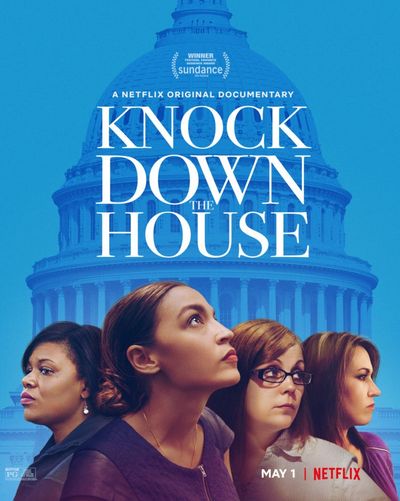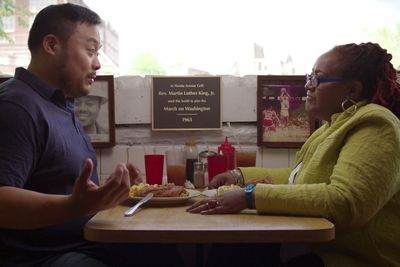Cindy and I had a calm Sunday evening, eating leftovers and watching Netflix. Both of the shows we watched had a strange, unexpected impact on me.
The first was Knock Down The House, a documentary about a group of first time, female political candidates who tried to unseat well established incumbents in the recent US midterm elections. In all the cases, these women were trying to win the primary election, that is, to unseat the entrenched incumbent in their own party, with a platform that was more compassionate towards the people in their ridings.

The most famous woman in the film (to we Canadians, at least) is Alexandria Ocasio-Cortez, who is now an active Congresswoman, but the other women were equally compelling. There was also Paula Jean Swearengin from West Virginia, who ran against her incumbent Senator on a platform of turning away from coal mining and caring for the people in her state, Cori Bush in Missouri, who was trying to bring racial equality to her district in St. Louis and Amy Vilela, who campaigned for Universal Health Care in Nevada.
The film really grabbed me for a couple of reasons. The first was how entrenched incumbents really have all the power in US politics. They have the funding, they’ve made strategic appointments to positions like elections officers, and they’ve benefited from support from lobbyists for years.
The huge mountain to overcome was apparent again and again. In St. Louis, Ms. Bush was running in a district which had been represented by the same family for over 40 years. Ms. Swearengin’s incumbent Senator had been promoting coal mining (with the support of the coal lobby) for years. In New York, Ms. Ocasio-Cortez’s incumbent Congressman had run unopposed for 14 years and had so loaded up the Elections Board that she knew she needed to present 10,000 signatures of support in order to get 1,500 approved so she could get on the ballot.
The second thing that grabbed me was just how much organizing went on, even by these rookie politicians. There was a group of progressive / civil rights activists that recruited first time, working class candidates from all over the US (including the four women in the film) and helped them organize their campaigns. The film was full of kitchen table meetings where the candidates tried to recruit friends and neighbours one person at a time.
It was impressive and scary at the same time. Scary because it takes an intense amount of vulnerability to ask people for help and huge courage to go up against the entrenched Goliath.
I was deeply moved by this film. Moved, and a little ashamed that I’m not tuned into this type of organzing in Canada. We’re part of the Council of Canadians and the David Suzuki Foundation, but aside from sending them money and reading the newsletters, I don’t really know what’s happening around the kitchen tables where I live.
Ugly Delicious Gets Serious #
We’ve also been enjoying Ugly Delicious, David Chang’s new series about regional/ethnic comfort food and how it’s come to the US, morphed, and then spread around the world. The Pizza and Taco episodes are excellent but the Fried Chicken episode is on another level entirely.

The thing is, fried chicken is such a loaded stereotype in the US that even ordering it in a restaurant can have extra meaning. The show tackles this head on, talking about the implications of a white person opening a fried chicken restaurant in the US South, or the double edged meaning of a black chef adding fried chicken to the menu in the Pacific Northwest.
But even as he unravels the secondary and tertiary meanings, Chang also explores how fried chicken appears on the plate in pretty much every culture in the world, from India to China to Korea and beyond. Every meat eating culture has a fried chicken dish or two, it seems.
Plus, I also learned that chickens were call “yard birds” in the US. Is this the reason behind the Jimmy Page’s ‘60s power blues band? It’s all connected, I bet.
More to learn, more to do #
The more we learn, the less we know. It’s a universal truth, but it still stings a little. I’m more ‘aware’ than most, but I’m still stunned by how hard it is for ordinary folks to have a big impact. I’ve got nothing but admiration for the people who know it’s hard and do it anyway.
Even something like David Chang asking about ordering fried chicken on camera takes courage. He’s asking questions that many of us are afraid to ask, for fear of offending.
And the people who run against the Establishment? Wow. Win or lose, that takes guts beyond anything I’ve every attempted, that’s for sure. I’m inspired to be that little bit braver with my projects, right now, before this feeling wears off.
Who knew a night of Netflix was going to stir me up like this? I’m just glad shows like this are out and available.
What say you? Are you involved in grassroots organizing? Making your community a better place? A Canadian with insights into community level activism? Let me know in the comments!